Ukraine vowed Friday to quash a surprise Russian ground offensive, after troops launched a major cross-border assault in the Kharkiv region, looking to chalk up fresh battlefield gains with Ukraine on the back foot.
Russian forces made small advances in the border zone it was pushed back from nearly two years ago. President Volodymyr Zelensky said a “fierce battle” was underway for control of the area.
Civilians were told to flee and heavy fighting was reported as Ukraine’s outgunned army rushed in reinforcements to defend the region, which has been mostly under Ukrainian control since September 2022.
“Russia launched a new wave of counter-offensive actions in this area. Ukraine met them there with our troops, brigades and artillery … Now there is a fierce battle under way,” Zelensky told a press conference in Kyiv.
In a later social media post after meeting his commander-in-chief, Zelensky reported “heavy battles along the entire front line” and promised a forceful response.
“Along our state border and along our front line, we will invariably destroy the occupier in such a way as to thwart any Russian offensive intentions,” Zelensky said.
Russia has remained silent on the assault, which would be its largest land operation in that part of the battlefield since it sent thousands of troops across the border in February 2022.
A senior Ukrainian military source said Russia had advanced one kilometre (0.6 miles) into Ukraine and was trying to “create a buffer zone” in the Kharkiv and neighbouring Sumy regions to prevent attacks on Russian territory.
Officials in Kyiv had warned for weeks that Moscow might try to attack its northeastern border regions, pressing its advantage as Ukraine struggles with delays in Western aid and manpower shortages.
Washington announced a new $400 million military aid package for Kyiv hours after the offensive began, and said it was confident Ukraine could repel any fresh Russian campaign.
“It is possible that Russia will make further advances in the coming weeks, but we do not anticipate any major breakthroughs, and over time, the influx of US assistance will enable Ukraine to withstand these attacks over the course of 2024,” National Security Council spokesman John Kirby told reporters.
“Russia will likely increase the intensity of fire and commit additional troops in an attempt to establish a shallow buffer zone along the Ukrainian border,” he said.
“We are confident in the Ukrainian (forces) and we are working around the clock to get them the equipment, the tools, the weapons that they need to defend against these attacks,” he said.
Ukraine’s military said it had deployed more troops and Zelensky said Ukrainian forces were using artillery and drones to thwart the Russian advance.
“Reserve units have been deployed to strengthen the defence in this area of the front,” it said.
Russia launched the attack early Friday, breaking through Ukraine’s lines under the cover of armoured vehicles, according to Kyiv.
While Russia’s defence ministry has not commented, military bloggers reported Moscow had made inroads.
“Active fighting is currently taking place in settlements one to two kilometres from the border with Russia,” Kharkiv region governor Oleg Synegubov said.
“We urge people to evacuate in this area,” he added.
A local official said there was “massive shelling” in Vovchansk, a town of about 3,000 people some five kilometres (three miles) from the Russian border, and that evacuations were underway.
Russian shelling killed three people in the Kharkiv region and two others in the eastern region of Donetsk, another hotspot, local prosecutors said.
“Enemy shelling from various types of weapons has been intensifying in Kharkiv region in the northern area for the last day,” Synegubov wrote on Telegram.
President Vladimir Putin warned in March he was considering creating a “sanitary zone” in Ukrainian territory adjoining Belgorod, a Russian region frequently targeted by Ukrainian shelling.
Ukrainian shelling on Russian border villages killed at least two people on Thursday, the governors of Russia’s Belgorod and Kursk border regions said.
Pro-Ukrainian militias also claimed this year to have stormed Russia’s frontier in a series of brazen raids, a source of embarrassment for the Kremlin.
AFP

AFP







